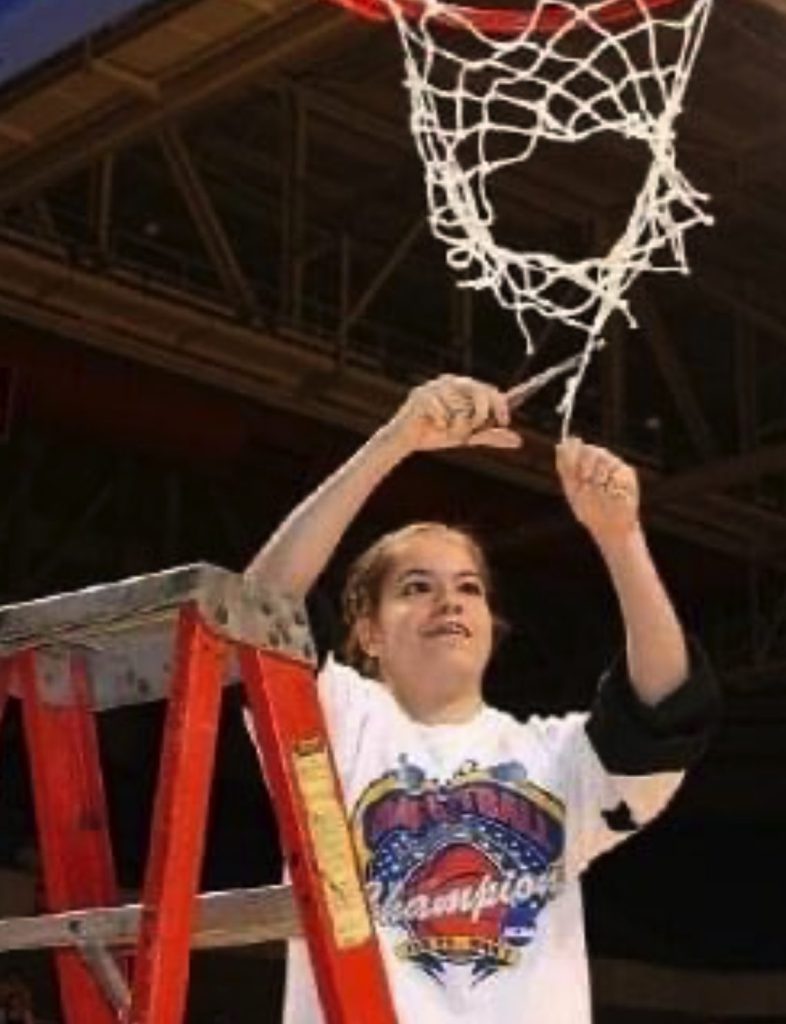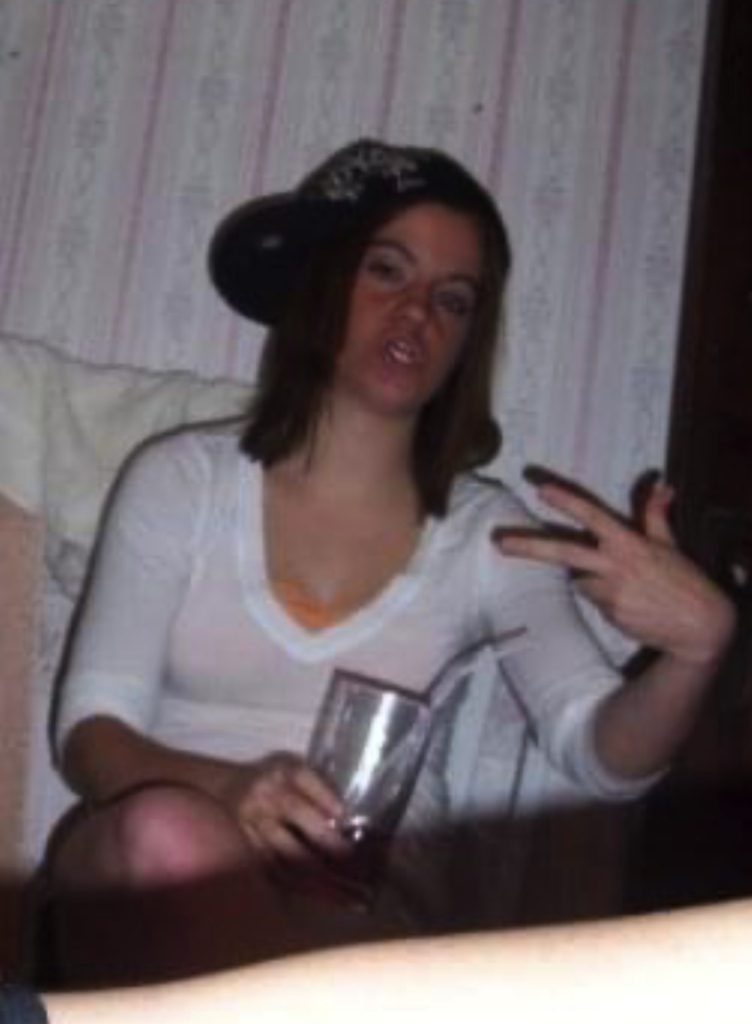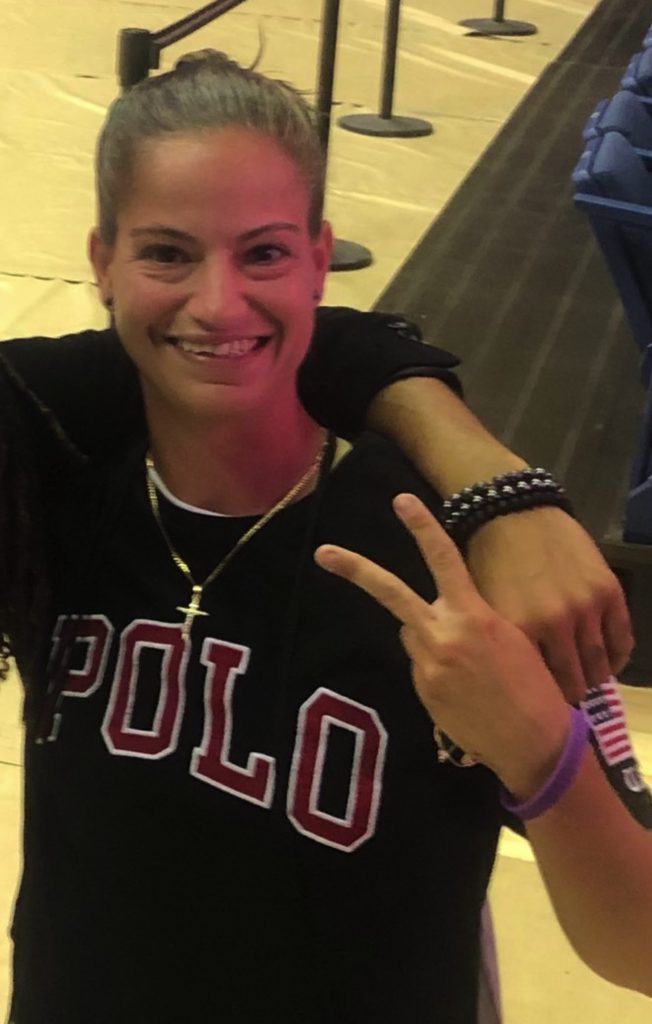
As a teenager, Kara Boczek dreamed of playing college basketball.
The sport was her “one true love” and the hobby she leaned on throughout her high school career. Kara’s hard work paid off when she earned First Team All-State and went on to play college basketball. At the time, life was good.
Two years in, a new love replaced the one she held for basketball.
Once my addiction started, nothing else mattered—just the next high.
“I played basketball for two years before my addiction truly came into play,” recalls Kara. “Once my addiction started, nothing else mattered—just the next high.”
When she got to college, Kara started experimenting with alcohol and marijuana. One night at a party, she joined her friends in trying opioids for the first time. The rest, she says, was history.
“My addiction came to light one night at a party when someone who had a previous knee surgery brought a script of pills,” says Kara. “A few people were sitting around a table crushing up and snorting them. They asked me if I wanted to try and without much hesitation, I said yes.”
Looking back, Kara recognizes that night as a turning point in her life. “Just one time” turned into several, and her life path took a drastic turn.
“The feeling I got was a feeling I had been missing my whole life,” says Kara. “That ONE time changed my life—after that it was all downhill.”
Addiction didn’t just affect my life— it ended up controlling it.

By her junior year, Kara had lost her interest in basketball. As her disease took hold, so did its control over her life. It wasn’t long before she dropped out of school and experienced turmoil in her close relationships.
“Addiction didn’t just affect my life— it ended up controlling it,” says Kara. “My parents and siblings were worried, and the only kind of relationships I cared about were the ones with drug dealers and people who were doing the same things as me.”
As Kara sunk deeper into the grips of addiction, her tolerance to opioids began to increase. She had to buy more and more just to experience the same effect. Eventually, she turned to heroin, a cheaper drug with a more immediate and intense high.
“Heroin was way less [expensive] and I didn’t need nearly as much to get the high I was looking for,” says Kara. “I got on a suboxone program to try and get sober, but it only led me to cocaine and crack use because suboxone blocks the opioid high but not any other kind of drug.”
Desperate for healing, Kara was in and out of outpatient treatment programs time and time again. Suboxone helped her come down off speed, but ultimately ended up being another crutch fueling her addiction. She was kicked out of treatment clinics twice due to failed drug tests, and eventually realized using drugs was no longer as simple as getting high.
She was doing everything in her power to not feel sick— but the drugs didn’t have the same effect anymore.
“I was letting people use my car to drug traffic and selling anything of value because all I cared about at this point was not being sick,” recalls Kara. “I remember one night lying in bed so sick and the next morning I got up and I didn’t have the keys to my car. I was so mad I couldn’t go get what I needed to feel better. I remember breaking down and telling myself, ‘I have had enough of feeling this way and working so hard just to take the edge off’.”
I was sick and tired or feeling sick and tired.
Ready to change, Kara reached out to her outpatient counselor for help. When he asked if she was prepared to go to a halfway house five hours away, she answered with a resounding ‘yes’.
“I didn’t get the warm fuzzy feeling drugs first gave me anymore,” says Kara. “I was sick and tired of being sick and tired.”
Like most individuals suffering from addiction, Kara’s path to recovery wasn’t linear. She attended outpatient clinic and meetings, but ended up back at square one as she continued surrounding herself with the people and places who supported her addiction.
“I stayed on a good path for awhile until I ended up back where I was because I didn’t want to be honest or listen to what I was supposed to do to stay sober,” says Kara. “I wanted to still be at the same dangerous places with people who were doing the same thing I loved —getting high. I was also addicted to the lifestyle of selling drugs and everything that comes with it.”
Kara continued to struggle until she hit what she calls her “lowest point”. Kara tried administering drugs with a needle, a method that delivers substances directly into the bloodstream through a vein. Practiced by 775,000 Americans in 2017, injection methods of abusing drugs increases risks for HIV, overdose, and death.
“The girl I was with, who had been using a needle for awhile, begged me not to,” says Kara. “But at this point nothing anyone said mattered to me. I was on a self-destructive path.”

I am able to share my experience, strength, and hope with them.
After she hit rock bottom, Kara sought help. And this time, it stuck. Previously controlled by addiction, Kara’s life has now transformed into one of healing, inspiration, and purpose.
“My sobriety date is March 17, 2011, so God willing this year I will have 11 years clean,” Kara says.
She uses her story to connect with foster children who are struggling as part of her career in child youth services. In her role, she sees kids heading down the same path that led to her addiction and offers them support.
“Kids today are using drugs younger and younger”, she says. “I am able to share my experience, strength, and hope with them.”
If I had some education about it, my path might have been different.
Looking back at the start of her descent into addiction, Kara recognizes that one night at a party as a choice that unleashed a part of her brain she didn’t know existed. This revelation is on par with scientific research that suggests 40 to 60 percent of a person’s addiction risk is based on genetics.
“I truly believe I was born with an addicted personality,” says Kara. “Looking back, from a young age I see many addictive traits and at the time I didn’t know—but now after my addiction, it all makes sense.”
It’s one reason why Kara is now an advocate for programs like Game Changer, WV whose mission is to stop substance abuse before it starts among youths.
“I truly believe I could have benefited from early education about substance abuse,” says Kara. “I had no idea how serious substance abuse was until I was right in the middle of it. If I had some education about it, my path might have been different.”
As Game Changer representatives try to make impact throughout the state, Kara says early intervention needs to happen not only in the home, but also in schools.
“To me it’s more than just Math, Science, English, History and so on,” says Kara. “I’ve seen kids with 4.0s but what’s going on inside them? What’s their home life like? I feel like those kids are overlooked because, ‘oh, they have fantastic grades and all these scholarships for colleges.’ But people don’t think about how they feel on the inside. Are they truly ready for the real world and what it has to offer? I have met a lot of addicts who were perfectionists because [drugs] are the one thing they had to turn to or maybe the only thing they had that made them truly happy.”
I’ve lost many friends who said ‘just one time’—but that one time was the last time.
For those experimenting with drugs or struggling with addiction, Kara has a clear message.
“Your life can change by telling yourself, ‘it will only be one time,” she says. “I’ve lost many friends who said ‘just one time’—but that one time was the last time.”
Learn more about GameChanger
GameChangers’ Opioid and Substance Misuse Prevention Program was born out of collaboration between GameChangers and the Hazelden Betty Ford Foundation. The mission leans on student-peer leadership to encourage children to make smart, healthy decision about opioids, alcohol, and other substances.
To learn more or seek help, visit gamechangerusa.org.